Traditional Neurofeedback
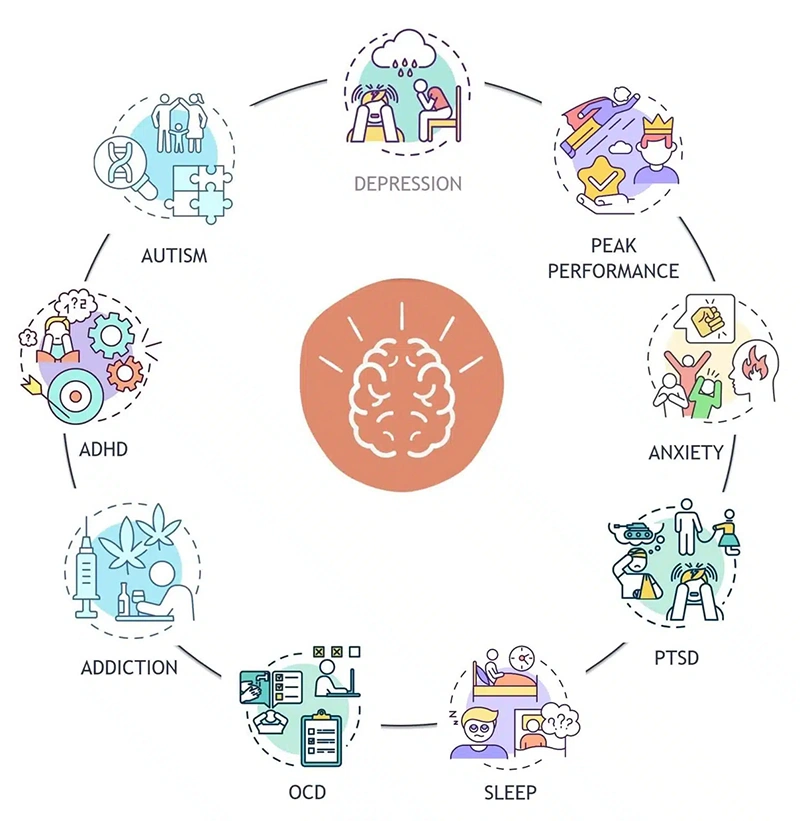
Traditional Neurofeedback
A proven, non-invasive, and natural therapy that delivers lasting improvements in mental health.
Regulate emotions, improve focus, and promote restful sleep
— without medication or invasive procedures.
Key concepts:
Goal
The goal is to improve brain function by teaching self-regulation of brainwave patterns, aiming to enhance mental performance, emotional regulation, and overall well-being.
Method
Dry electrodes are placed on the scalp to measure brainwave activity (EEG), which is then displayed to the user through visual or auditory feedback.
Brainwave Types
Different brainwaves (alpha, beta, theta, delta) correspond to different mental states (relaxation, focus, deep sleep, etc.).
Training Process
The individual learns to adjust their brain activity based on the feedback they receive, which can help reinforce healthier brainwave patterns.
Applications
Neurofeedback has been used for conditions like ADHD, anxiety, depression, PTSD, and insomnia.
Non-invasive
The process is non-invasive, with no medication or surgery required.
Effectiveness
It is considered a promising alternative or complement to traditional treatments. It may require multiples sessions for noticeable results.

Benefits of Neurofeedback:
Tailored sessions to address your unique needs and goals.
Improved Emotional Regulation:
Gain better control over your emotions and reactions in everyday situations.
Enhanced Mental Performance:
Improve focus, clarity, and decision-making abilities.
Long-term Results:
over time, your brain learns healthier patterns that can lead to lasting improvements in mental well-being.
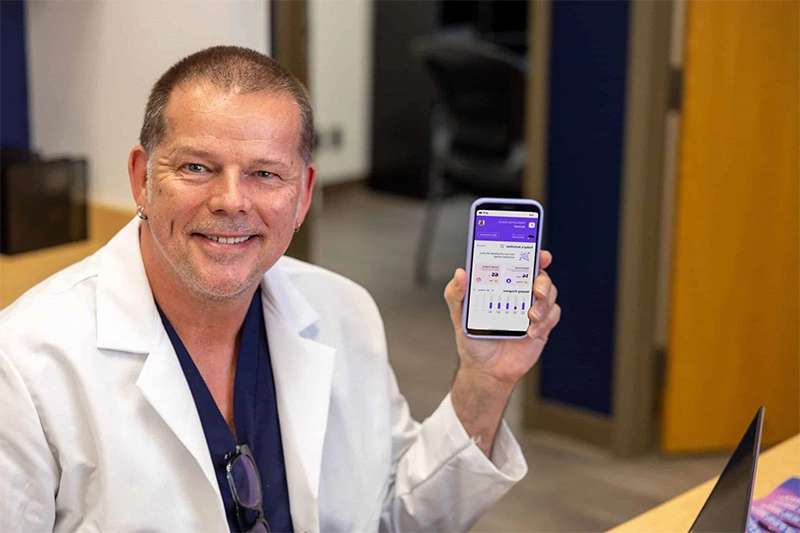
What to Expect
Delivery method:
- This treatment is done at home. You will purchase a cap and download an app to use it with.
- If you would like to meet your therapist in person you may choose to do your first two sessions in the clinic in Whitby, ON.
- If you are best served virtually, you may meet complete the entire process using online sessions.
Here's the process side by side for each choice:
Step 1: in person or virtual appointment.
- Session 1
- Length: 50 minutes
- Fee: $150.00 to $235, depending on your chosen therapist.
- We conduct an intake assessment to understand you goals and expectations.
- We answer all your questions about neurofeedback.
- We book your assessment session for 3-4 weeks later to allow for your cap to be delivered.
Virtual client
Step 2:
- Order your dry cap, Brain Bit Flex, directly from the makers:
Step 3:
- Session 2
- Length: 50 minutes
- Fee: $150.00 to $235, depending on your chosen therapist.
- MiniQ (brain activity recording and mapping)
- Set up in training app including: user account and baseline questionnaires to track your progress.
- Review of treatment goals.
- Book 1st follow up session in about 30 days.
In-person client
Step 2:
- Session 2
- Length: 50 minutes
- Fee: $150.00 to $235, depending on your chosen therapist.
- MiniQ (brain activity recording and mapping)
- Set up in training app including: user account and baseline questionnaires to track your progress.
- Review of treatment goals.
- Book 1st follow up session in about 30 days.
Step 3:
- Order the device recommended by your therapist from here:
Step 4:
- In their own time, your therapist will review the MiniQ carefully to select activate a training protocol for you according to their findings and your treatment goals.
Step 5:
- About 1 to 5 business days after MiniQ. You will receive an email from your therapist indicating you to start your at home training. Plan to train for about 20 minutes a day at least 3 times per week.
Step 6:
- On the day you are notified of your protocol activation, you will be charged for your 1st month of training.
Step 7:
- Therapist will begin monitoring and respond to email inquiries should you have any.
- Meet your therapist monthly to discuss progress by reviewing changes in your brain activity and behavior.
- Continue until you reach your desired result.

Fees for individuals and families:
Minimum Commitment: Neurofeedback requires a minimum 4-month commitment. Results aren’t immediate, as the brain needs time to learn and integrate the changes. Patience and consistency are key.
Each month your payment includes:
- Unlimited training in the app.
- Technical support via email
- Monthly follow up visit
- Continuous monitoring by your therapist
You have three options:
$300/ Month
$350/ Month
Includes all mentioned above with a 50 minutes monthly follow up. Ideal for those already receiving talk therapy at our clinic or looking to include its along side neurofeedback.
$475/ Month
Insurance Coverage:
Of our services:
All receipts of sessions with our psychotherapist can be submitted for reimbursement to your extended healthcare insurance if your plan covers “Psychotherapist”.
The device and app:
- The app is covered by your monthly payments for our services.
- The cap or training device may be eligible for "Healthcare spending accounts".
- We cannot make a receipt for the device because we do not sell it.
- You may consult your insurance for further information about getting it covered.
Billing
Payment forms accepted:
e-transfer and credit card.
Billing schedule:
Once the training protocol is active you will be billed for the entire month.
Your billing will be automatically processed on the same day each month.
The first payment will take place on the day your therapist activates your first training protocol.
Payment Failures:
Any failed payment will lead to termination of training access.
No Refund:
All payments received are non-refundable, regardless of having used the app for training or not as that is a factor we cannot control.

Commitment requirement and termination of service:
Treatment duration:
Minimum commitment of 4 months is required when signing up.
Commitment to Monthly Follow-Ups:
Failure to attend a scheduled monthly progress session will result in termination of access to the app and training within 24 hours.
No changes in medications or supplements:
Once you start training it is imperative that you avoid making any changes to any supplements or medications such as (but not limited to) magnesium, antidepressants, anti anxiety, sleep aids, stimulants and any other supplement or medicine that can impact your brain health or performance. This is so that we can clearly see the impact that neurofeedback training has on you.
Time investment:
Training will require 20 minutes per say on average at least 3 times per week or daily.
Termination before the 4 month:
Must advise us at least 15 days before your next billing period in writing, via email to your therapist and you will be charged an early cancellation fee of $150.00.
Termination after 4 months:
Must advise us at least 15 days before your next billing period in writing, via email to your therapist. A conversation is not acceptable. No cancellation fee will apply.
Termination process:
When terminating, the access to the app will be terminated by your therapist and payments will be processed within 1-2 business days of receiving your email request.
Results disclaimer:
Neurofeedback results vary and aren't guaranteed. Progress depends on factors like consistency, brain patterns, and overall health.
This is your time—invest in yourself and your well-being.
We're here to support your journey.
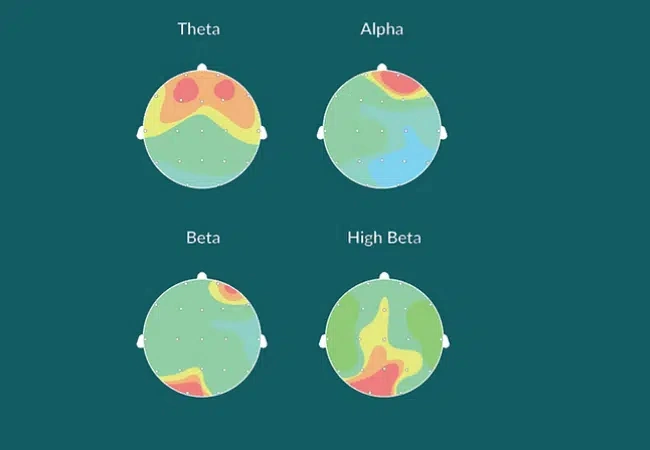
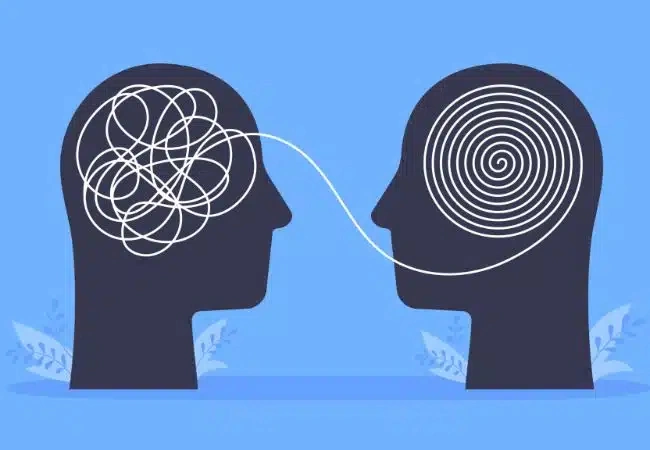
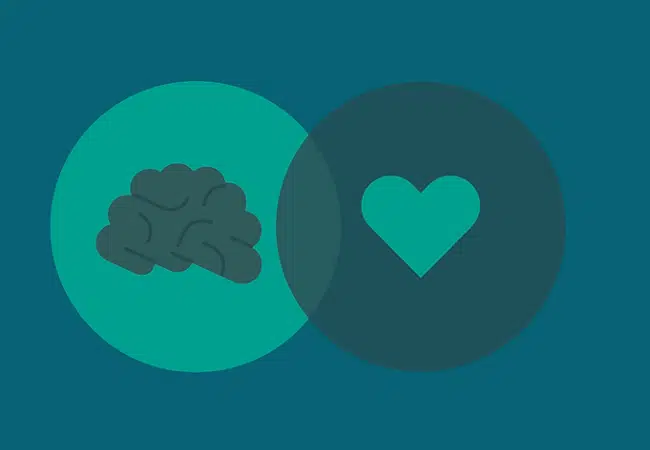


According to studies, neurofeedback may improve the communication between the amygdala and the ventrolateral prefrontal cortex. When the connection is established again, the ventrolateral prefrontal cortex is better able to respond appropriately to possible threats, which reduces the impulsive, hyperactive behaviors commonly linked to anxiety.

